Vol. 147, No. 12 — June 5, 2013
Registration
SOR/2013-104 May 24, 2013
FAMILY ORDERS AND AGREEMENTS ENFORCEMENT ASSISTANCE ACT
Regulations Amending Certain Regulations Made Under the Family Orders and Agreements Enforcement Assistance Act
P.C. 2013-571 May 23, 2013
His Excellency the Governor General in Council, on the recommendation of the Minister of Justice, pursuant to sections 22 (see footnote a) and 61 (see footnote b), subsections 67(2) (see footnote c) and (3) (see footnote d) and section 78 (see footnote e) of the Family Orders and Agreements Enforcement Assistance Act (see footnote f), makes the annexed Regulations Amending Certain Regulations Made Under the Family Orders and Agreements Enforcement Assistance Act.
REGULATIONS AMENDING CERTAIN REGULATIONS MADE UNDER THE FAMILY ORDERS AND AGREEMENTS ENFORCEMENT ASSISTANCE ACT
RELEASE OF INFORMATION FOR FAMILY ORDERS AND AGREEMENTS ENFORCEMENT REGULATIONS
1. (1) Paragraph 4(1)(a) of the Release of Information for Family Orders and Agreements Enforcement Regulations (see footnote 1) is amended by replacing “Schedule I” with “Schedule 1”.
(2) Paragraph 4(1)(b) of the Regulations is amended by replacing “Schedule II” with “Schedule 2”.
2. Schedules I and II to the Regulations are replaced by the Schedules 1 and 2 set out in Schedule 1 to these Regulations.
FAMILY SUPPORT ORDERS AND AGREEMENTS GARNISHMENT REGULATIONS
3. Section 5 of the Family Support Orders and Agreements Garnishment Regulations (see footnote 2) is amended by replacing “Schedule I” with “Schedule 1”.
4. Section 9 of the Regulations is amended by replacing “Schedule II” with “Schedule 2”.
5. Schedules I and II to the Regulations are replaced by the Schedules 1 and 2 set out in Schedule 2 to these Regulations.
DENIAL OF LICENCES FOR FAMILY ORDERS AND AGREEMENTS ENFORCEMENT REGULATIONS
6. (1) The portion of section 2 of the Denial of Licences for Family Orders and Agreements Enforcement Regulations (see footnote 3) before paragraph (a) is amended by replacing “Schedule I” with “Schedule 1”.
(2) Paragraph 2(a) of the Regulations is amended by striking out “and” at the end of subparagraph (x) and by adding the following after subparagraph (xi):
(xii) language of choice for correspondence, if known; and
7. Section 3 of the Regulations is amended by replacing “Schedule II” with “Schedule 2”.
8. Section 4 of the Regulations is amended by replacing “Schedule III” with “Schedule 3”.
9. Schedules I, II and III to the Regulations are replaced by the Schedules 1, 2 and 3 set out in Schedule 3 to these Regulations.
COMING INTO FORCE
10. These Regulations come into force on June 7, 2013.
SCHEDULE 1
(Section 2)
SCHEDULE 1
(Paragraph 4(1)(a))
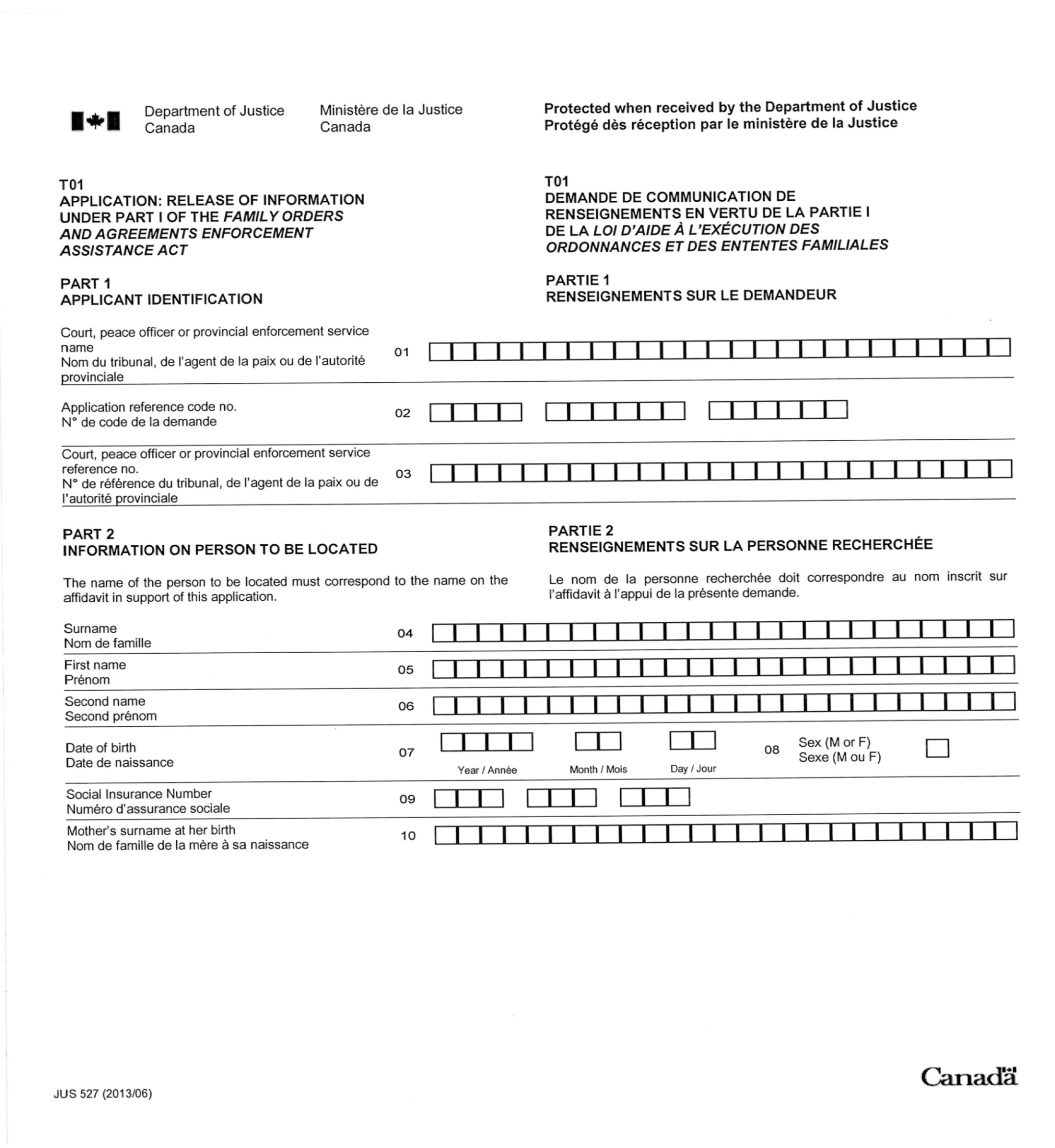
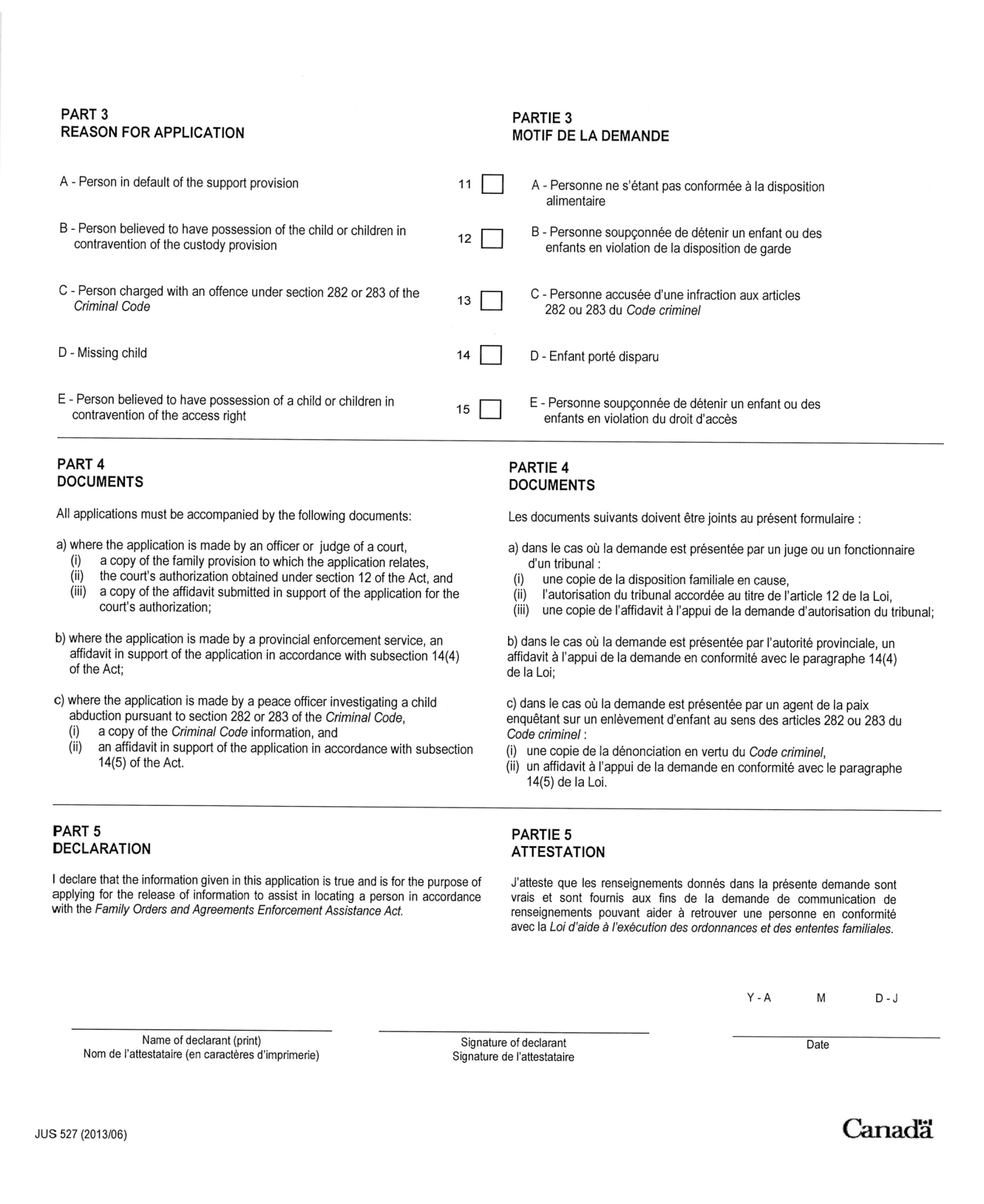
SCHEDULE 2
(Paragraph 4(1)(b))
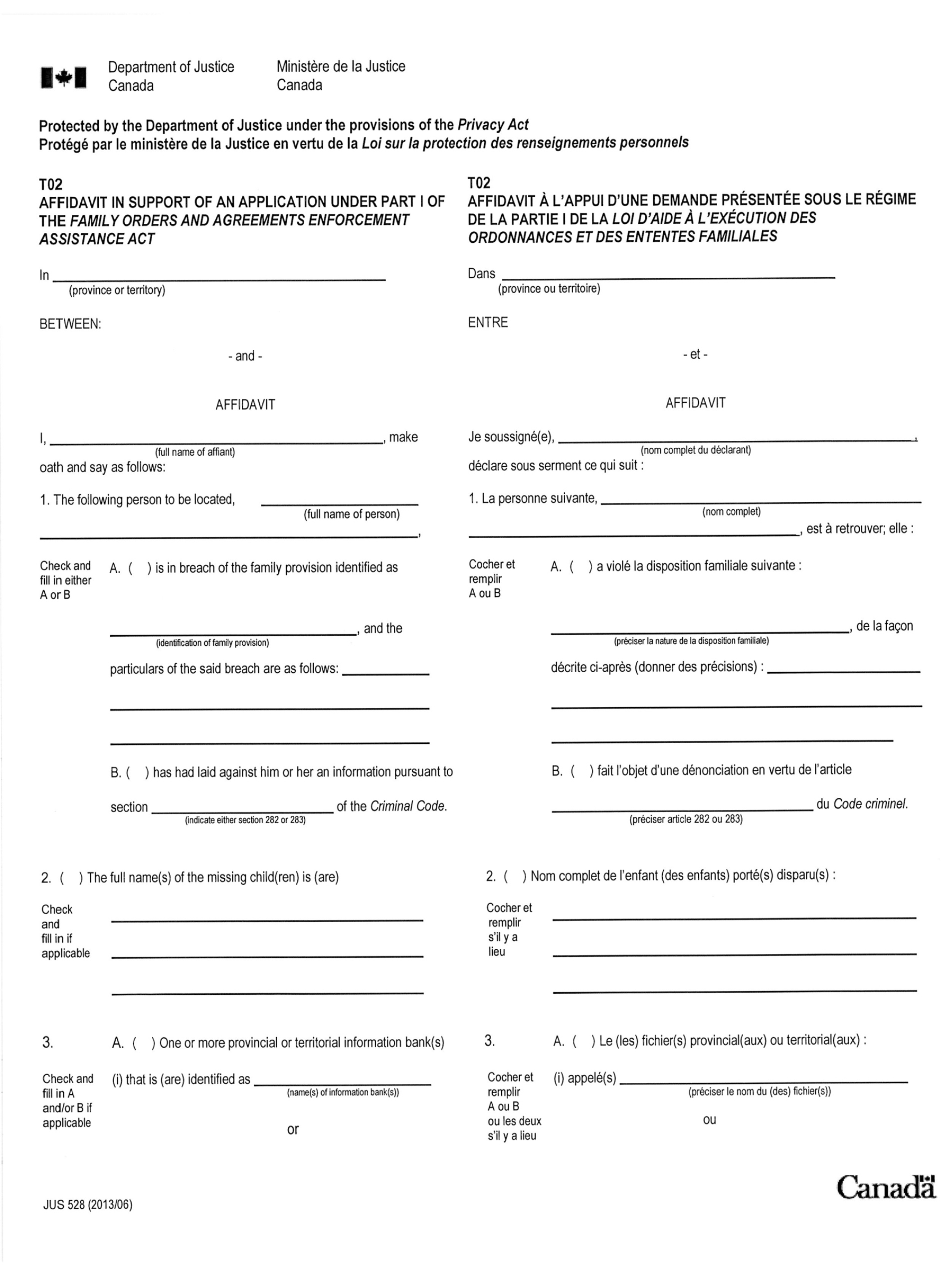

SCHEDULE 2
(Section 5)
SCHEDULE 1
(Section 5)
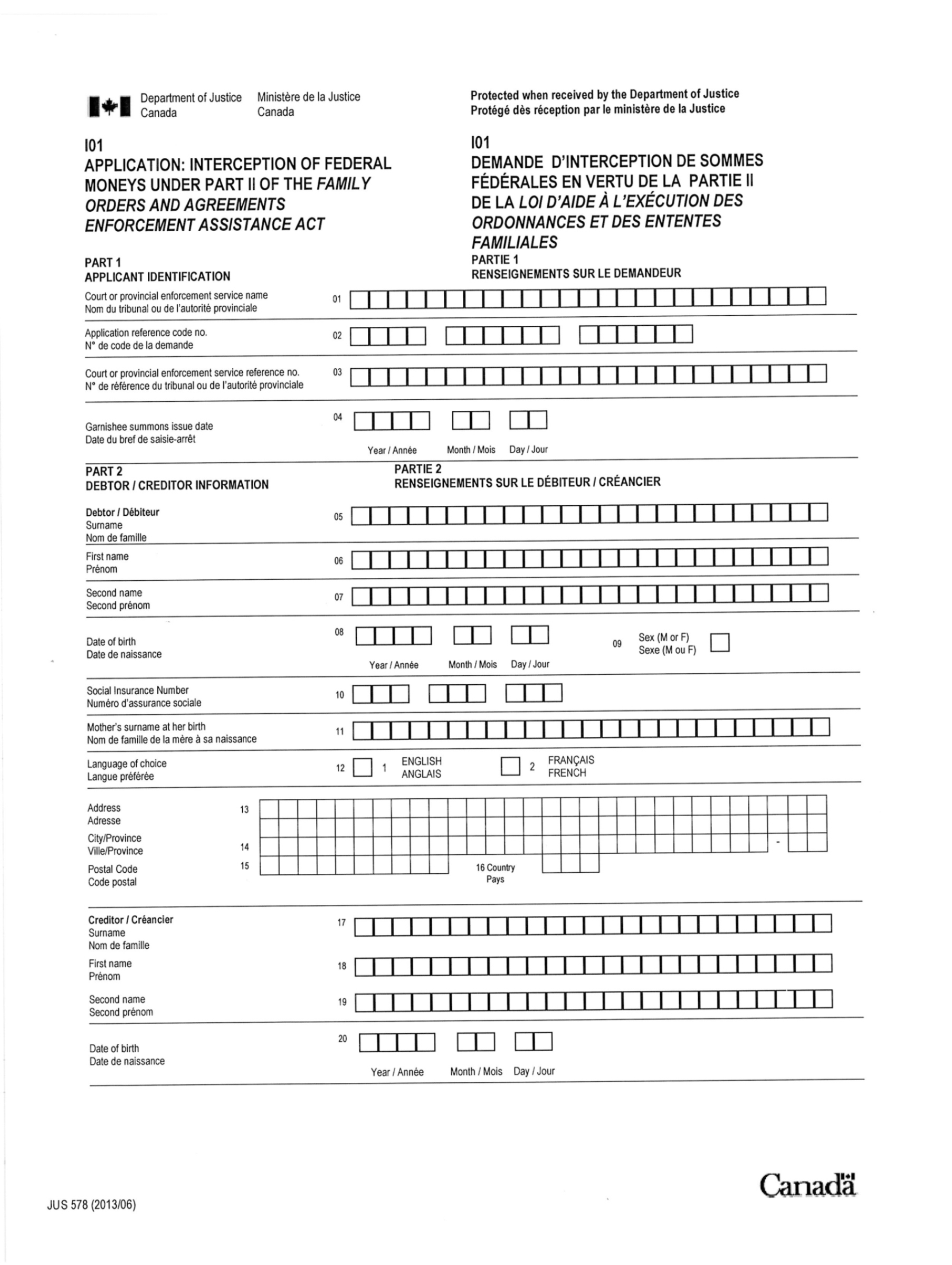
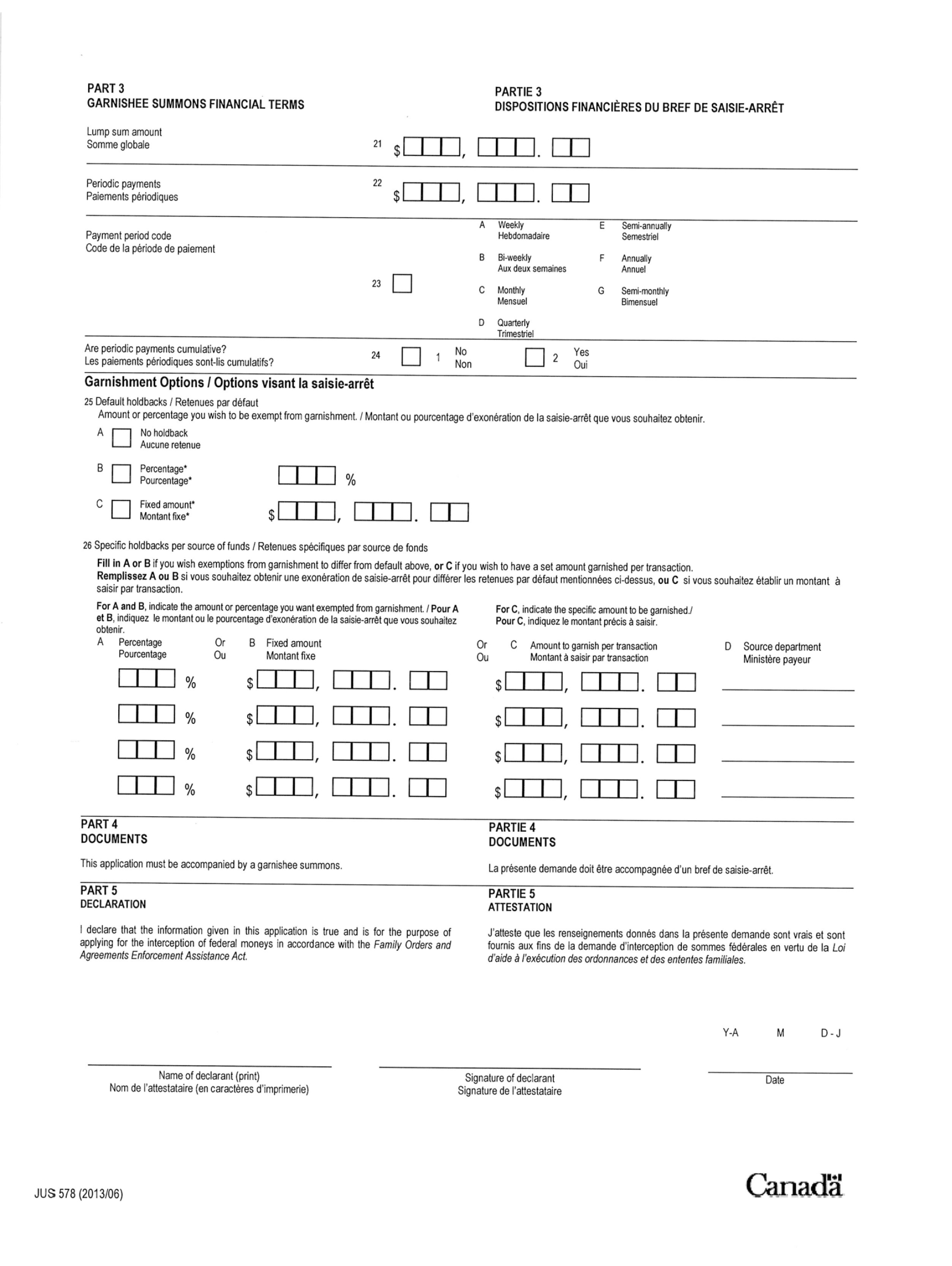
SCHEDULE 2
(Section 9)
NOTICE TO DEBTOR
Telephone: 1-800-267-7777
Fax: 613-990-8197
TDD: 1-800-267-7676
Date:
Take notice that on ______________ the Government of Canada was served with a garnishee summons. This summons was served by the following court or a provincial or territorial entity: ______
Account Number: ______________
Department of Justice Reference Number: ______________
Effective on ______________, the summons indicates that you owe the following amounts for family support:
- Arrears owing $______________ as of the summons issue date of ______________.
- Periodic payments of $______________ as of ______________.
Any moneys that are payable to you by the Government of Canada under Acts, funds or programs designated in the regulations made under the Family Orders and Agreements Enforcement Assistance Act may be diverted to pay the judgment creditor named in the summons.
If you have questions about the amount of money due or if you wish to dispute the garnishee summons, please contact the issuing court or the provincial or territorial entity.
After sufficient moneys are diverted to pay the judgment creditor, an administrative fee will be deducted from moneys payable to you. This fee is $190, payable in five yearly instalments of $38.
The diversion of funds and the payment of the administrative fee are authorized by the Family Orders and Agreements Enforcement Assistance Act.
Family Orders and Agreements Enforcement Assistance Unit
Department of Justice
SCHEDULE 3
(Section 9)
SCHEDULE 1
(Section 2)
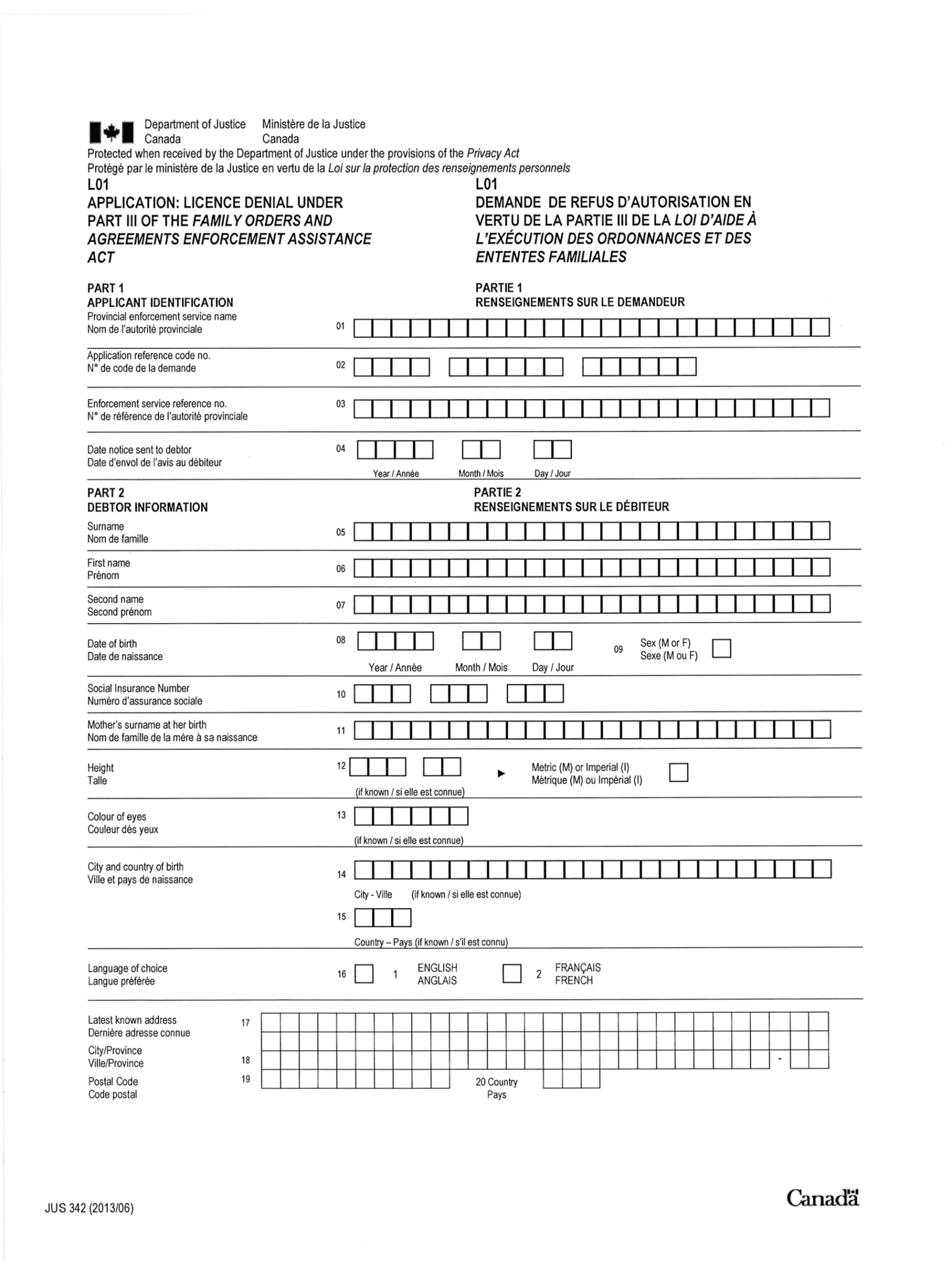
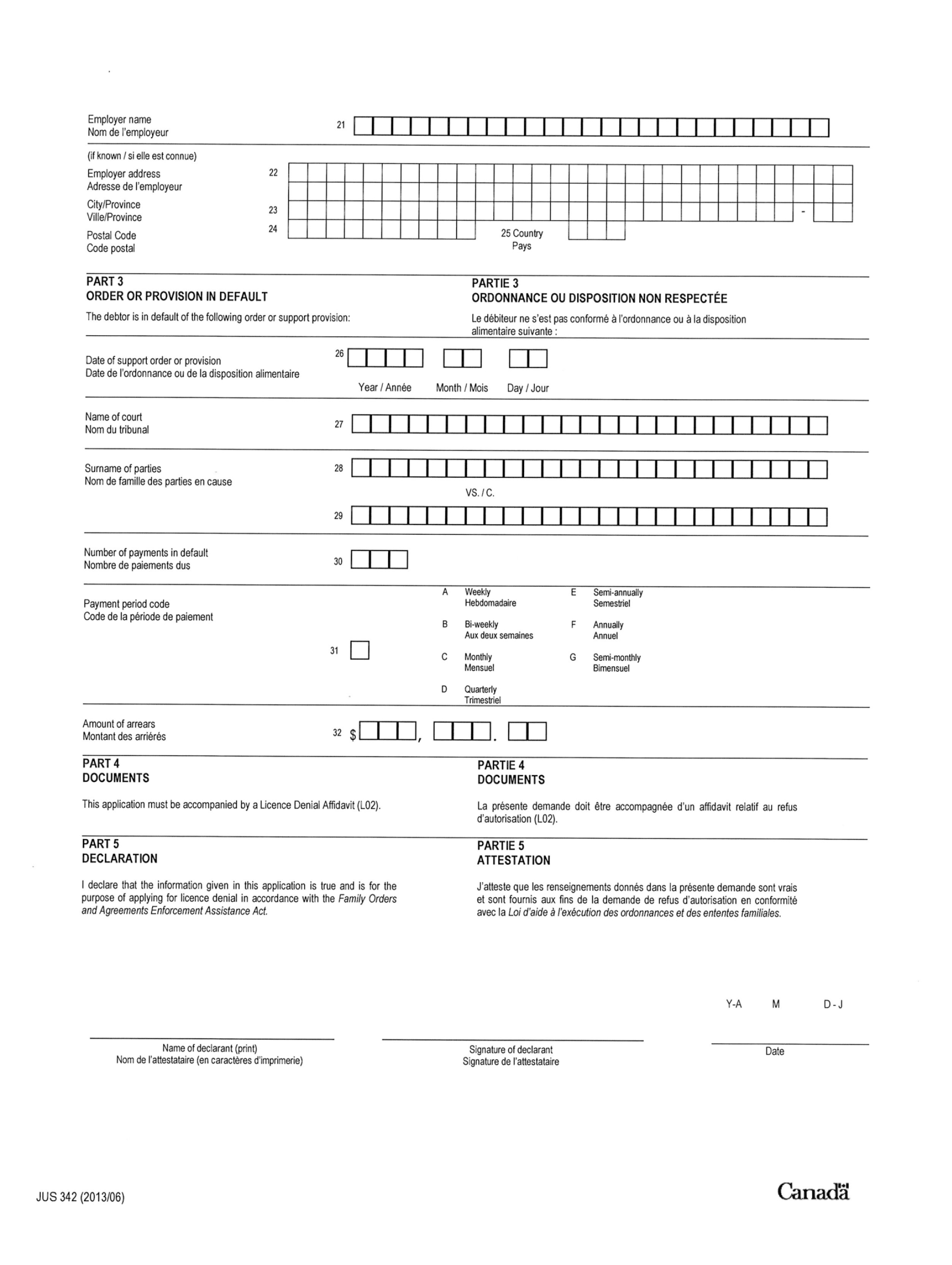
SCHEDULE 2
(Section 3)
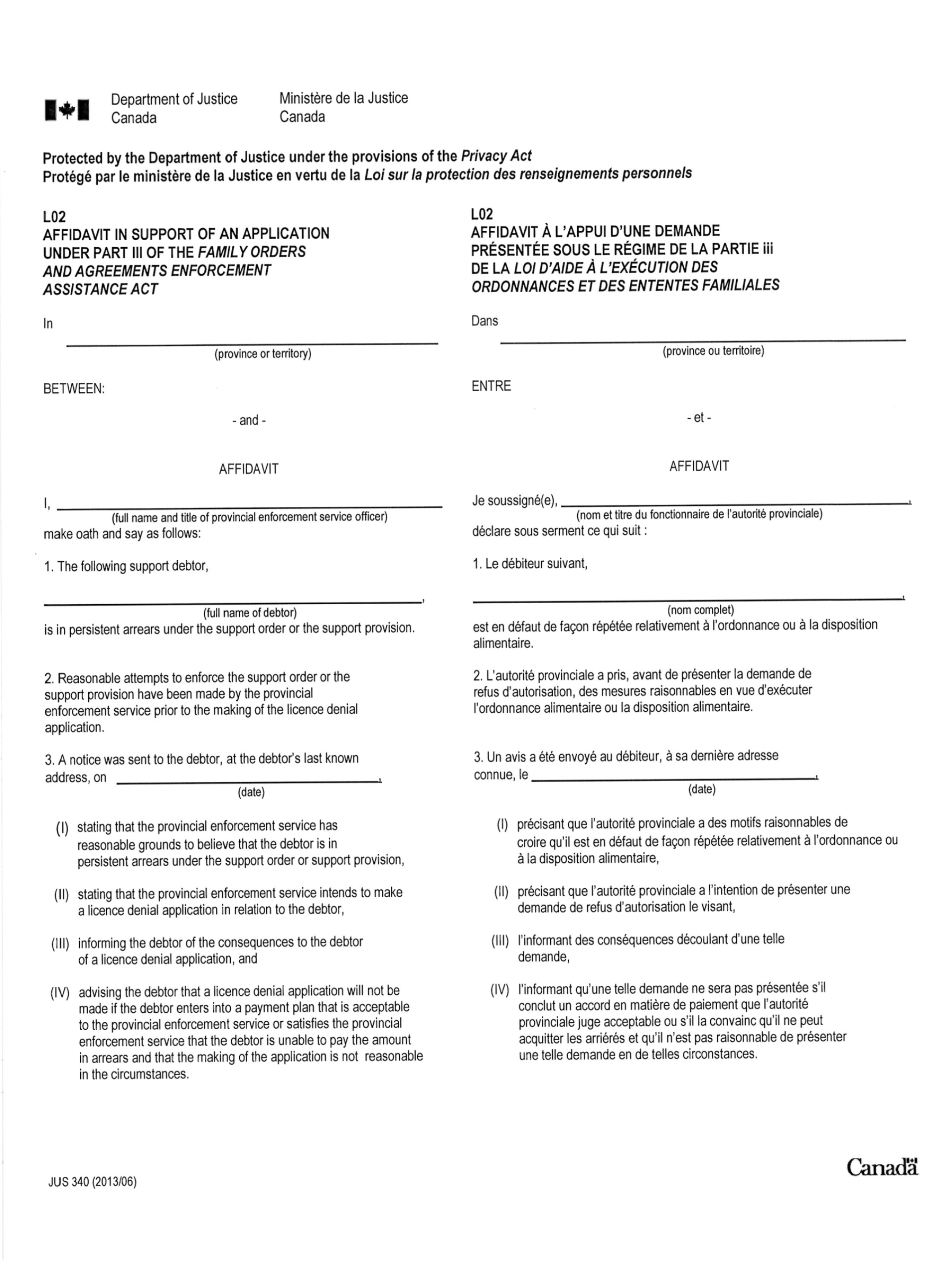
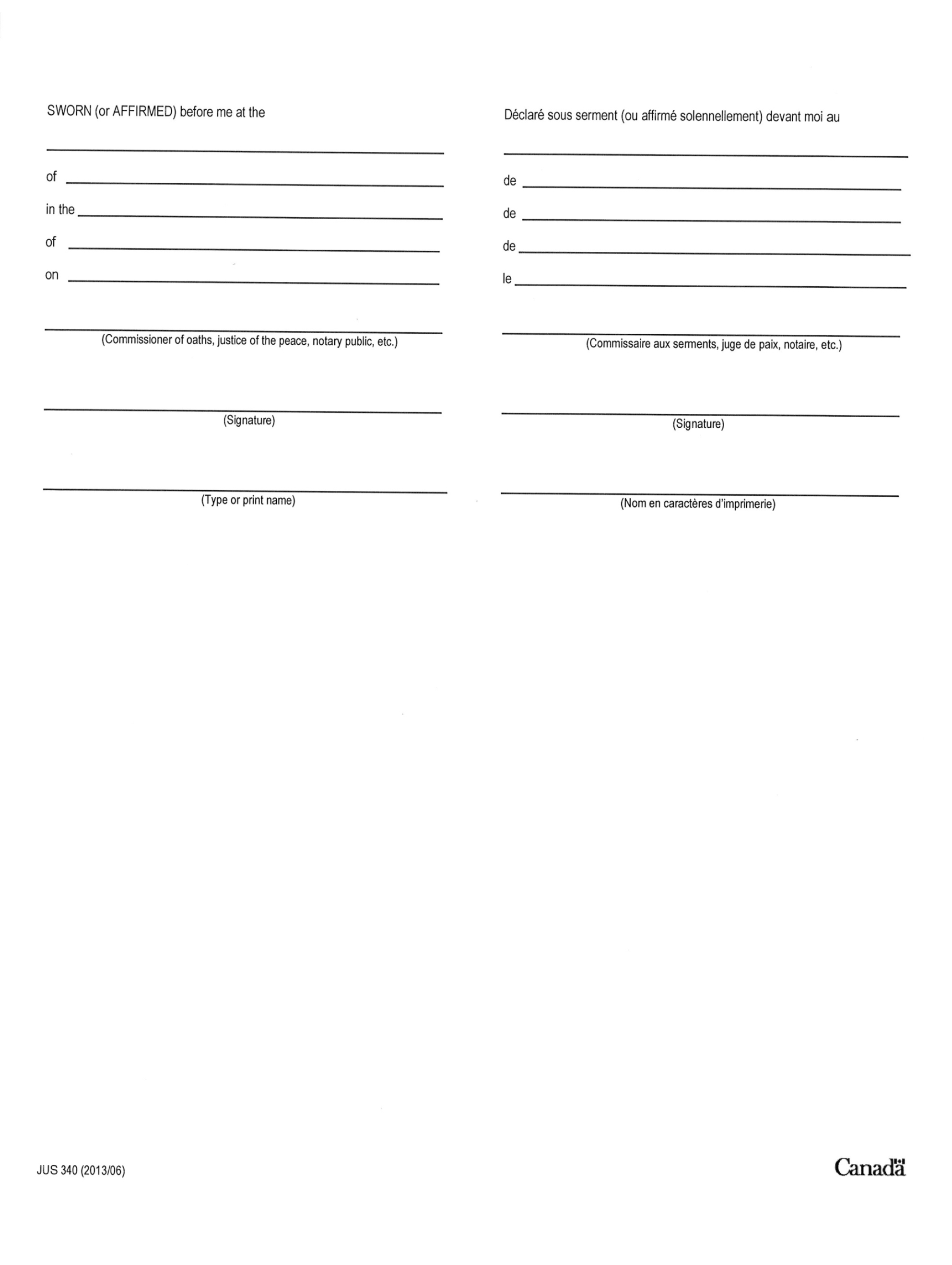
SCHEDULE 3
(Section 4)
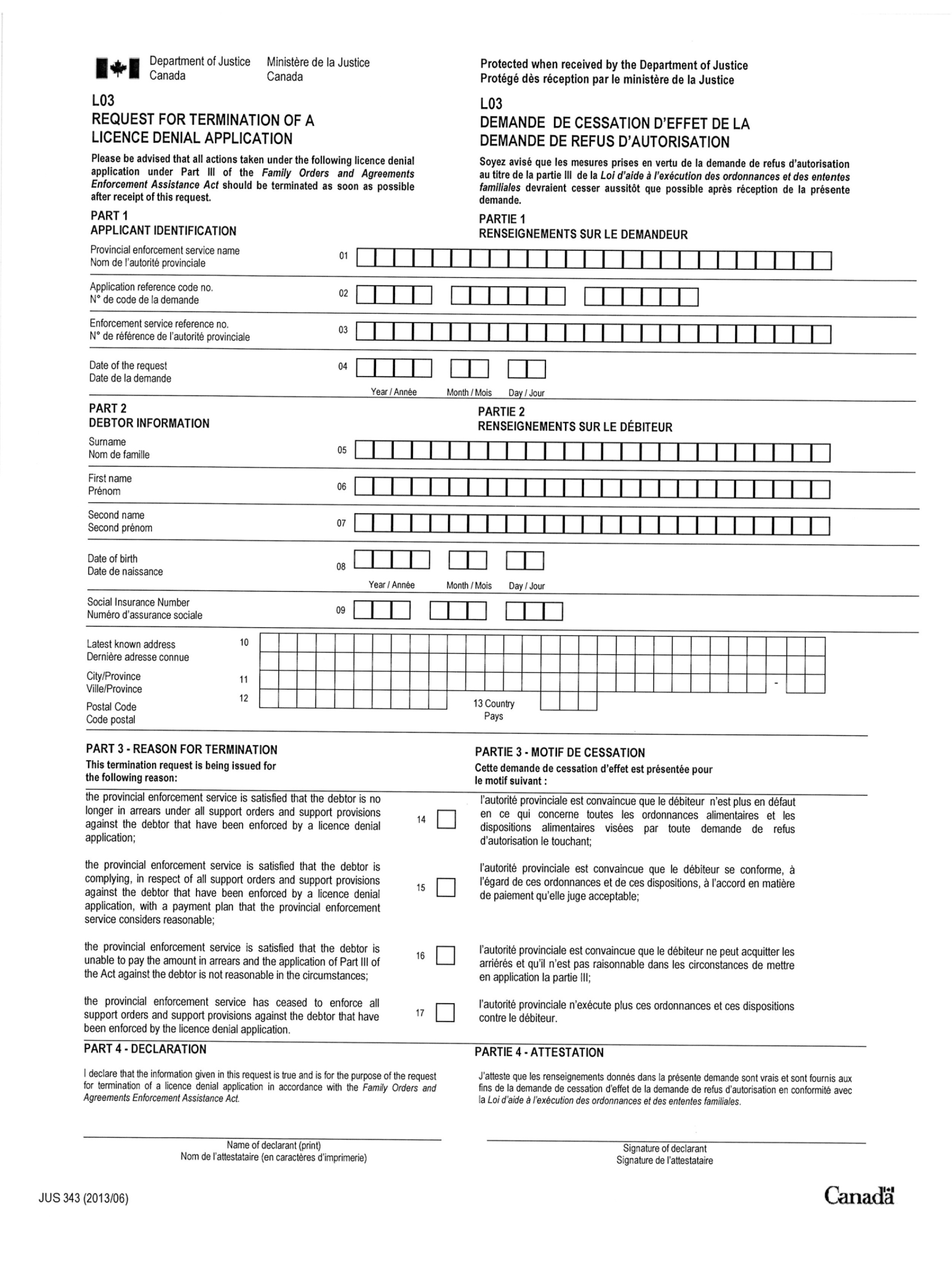
REGULATORY IMPACT ANALYSIS STATEMENT
(This statement is not part of the Regulations.)
Background
The Family Orders and Agreements Enforcement Assistance Act (FOAEAA) is an act that helps provinces and territories enforce family support obligations stated in support orders and support agreements. The Act permits the search for and release of information that may assist in locating family support debtors and other persons; the garnishment of certain moneys payable by Her Majesty in right of Canada to family support debtors; and the denial to, or suspension of, specified federal licences to certain family support debtors. The enactment of the FOAEAA indicated to Canadians that the federal government fully supported provincial/territorial efforts with respect to the enforcement of support obligations.
The FOAEAA consists of three Parts: Part I is for the release of information to locate a family support debtor; Part II is for the interception of federal moneys intended for a support debtor; and Part III is for the suspension/denial of federal licences to a support debtor.
Issues and objectives
Minor administrative modifications to the application forms, the affidavit forms and the Notice are required to make the forms clearer and easier to complete.
The amendments are intended to maintain the effectiveness of the processing of applications under the FOAEAA for the benefit of children and families. It is anticipated that clearer instructions would reduce the number of improperly completed applications, thus making the tracing, garnishment, and licence denial processes more efficient.
Description
Each Part of the FOAEAA has its own application form. The forms are found in three regulations made under FOAEAA. Applications made under Part I or III must be accompanied by an affidavit as set out in the Regulations. Once a Part III suspension/denial is in place, a separate application must be submitted to terminate the suspension/denial against the support payer. The Regulations for Part II of the FOAEAA also contain a Notice that the Department of Justice must send to the family support debtor.
Changes common to all application forms — FOAEAA Parts I,II and III
Although Part I applications may be submitted by police officers and courts, the vast majority of these applications are submitted by Provincial Enforcement Services (PES) officers. Part II applications may be submitted by PES officers and individuals who have obtained a garnishee summons from a court; most Part II applications are submitted by PES officers. Part III applications may only be submitted by PES officers.
The following changes have been made to each application form:
- — The instructions are amended to better assist the person submitting it in properly completing the forms;
- — The “Day-Month-Year” date fields are amended to “Year-Month-Day,” to conform to the standard format of date fields used in computer systems;
- — Extra character boxes are added to the end of certain existing fields to accommodate longer names and reference numbers; and
- — The forms now request “Mother’s surname at her birth” instead of “Mother’s name at her birth.” This is a clarification as the field to be inputted requests the surname only, not the first name and surname.
Changes specific to forms under Part I — Release of information
The heading of Part 3 of the application form is amended. Regarding the affidavit for Part I, the word “applicant” has been replaced with “affiant” since the person swearing to the affidavit is in fact an “affiant.”
Changes specific to forms under Part II — Interception of federal moneys
The application form has been amended to request, from the applicant, the creditor’s date of birth. This will assist the Department of Justice in vetting out duplicate garnishment applications (i.e. garnishment applications received from two different jurisdictions that are based on the same garnishee summons). The instructions under “Garnishment Options” of the Part II application have been amended to clarify, for the person submitting it, the purpose of the various boxes that should be ticked and completed (depending on whether there are default holdbacks for the garnishment, or if there are specific holdbacks that the applicant wishes to identify by way of either specific amounts or percentage). The wording of the payment period codes will also be amended so the person submitting it can provide more specific information concerning the frequency of payment provided for by the summons.
The wording in the Part II Notice form has been updated. For example, instead of listing the issuing body, court reference number, account number and the Department of Justice reference number at the very beginning of the Notice, the Notice instead begins with a short paragraph indicating the date upon which the Government of Canada was served with a garnishee summons and then identifies the body that served the summons upon Canada. This paragraph is followed by an account number and the Department of Justice reference number, and then by the specifics of the summons (as is the case presently). The word “funds” is added to the paragraph concerning the moneys which may be diverted to satisfy the summons. This is not a substantive addition and the inclusion of the word “funds” does not expand in any way the definition of federal moneys that may be garnished.
Changes specific to forms under Part III — Licence denial
Three forms are prescribed under this Part: the licence denial application, the affidavit in support of an application for licence denial and the request for termination of a licence denial application. The information provided in these forms is intended to help provinces and territories facilitate enforcement of support orders by encouraging debtors — upon notification of an impending federal licence denial — to contact the PES in order to make appropriate payment arrangements (i.e. to pay the arrears owed or to vary their support order).
The scheme involves the suspension and denial of federally issued licences (identified in the Schedule of the Act), such as aviation and navigation licences, and Canadian passports of individuals who are in “persistent arrears” of their family support obligations. Persistent arrears are defined as accumulated arrears of $3,000 or more, or arrears in any amount — where they are due to a failure of making full payment in respect of any three support payment periods.
The licence denial application (as well as section 2 of the associated Regulations) has been amended to add the debtor’s language of choice (so the Department of Justice knows in which official language the debtor prefers to communicate). The licence denial application has also been amended to provide more details concerning the payment period code that is to be completed by the applicant. The “Request for Termination of a Licence Denial Application” form has also been amended to add a field for the debtor’s date of birth and a field for the debtor’s last known address, which may assist in returning a suspended federal licence to the support payer following termination of the licence denial. Finally, an unnecessary line has been removed from the Part III affidavit form.
Consultation
Each of the 13 provincial/territorial enforcement services will be impacted as they must make appropriate changes to their electronic systems to accommodate the modifications to the FOAEAA application forms. The provinces and territories have been consulted on a regular basis regarding the proposed amendments (through a Systems Working Group and other meetings with the Department’s officials). They are supportive of the initiative.
Rationale
In 2011–2012, the Department of Justice processed approximately 35 000 FOAEAA Part I applications, 63 000 FOAEAA Part II applications, and approximately 9 300 FOAEAA Part III applications. These amendments may lower the Department of Justice’s administrative burden (time dedicated to following up with applicants whose forms either are incomplete or require clarification before they can be accepted), thus ensuring that applications are processed more efficiently.
Implementation, enforcement and service standards
The Department of Justice will post the new forms online and inform the PES officers of implementation of the new forms during regular monthly meetings. The Department of Justice will rely upon publication in the Canada Gazette and the posting of the new forms online as notification to the courts and police services.
To ensure that the Department of Justice delivers services to Canadians, the courts and provincial/territorial counterparts, it will continue to monitor the following established service standards:
- — processing applications under the FOAEAA, Part I, and responding to PES officers within 10 days of receiving an application;
- — processing FOAEAA, Part II, applications to ensure a garnishment becomes effective 35 days after receipt of the application; and
- — processing FOAEAA, Part III, applications within 10 business days of receipt.
Contact
Gregory Lacko
Counsel
Support Enforcement Policy and Implementation Unit
Family, Children and Youth Section
Department of Justice
Telephone: 613-957-3535
Fax: 613-952-9600
- Footnote a
S.C., 1997, c. 1, s. 20 - Footnote b
S.C., 1993, c. 8, s. 18 - Footnote c
S.C., 1997, c. 1, s. 22 - Footnote d
S.C., 1997, c. 1, s. 22 - Footnote e
S.C., 1997, c. 1, s. 22 - Footnote f
R.S., c. 4 (2nd Supp.) - Footnote 1
SOR/87-315; SOR/2002-278 - Footnote 2
SOR/88-181 - Footnote 3
SOR/97-180